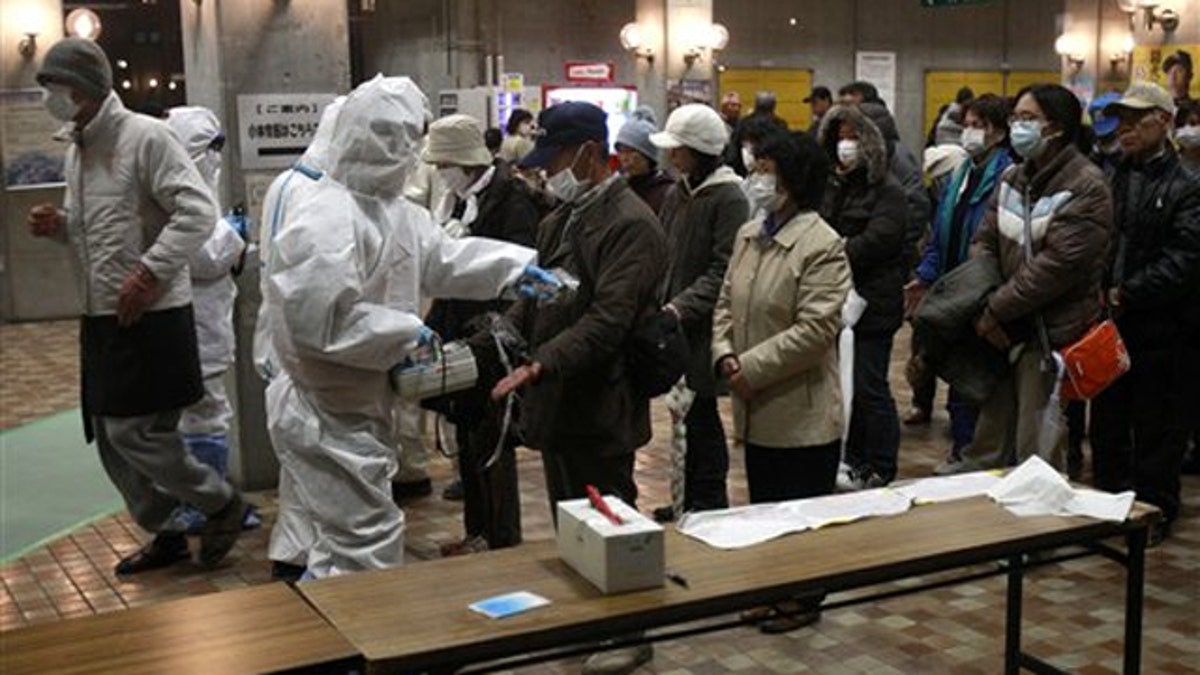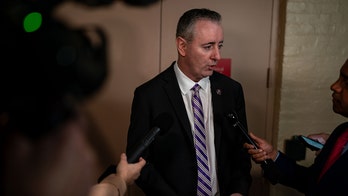
Evacuees are screened for radiation exposure at a testing center March 15 in Japan's Koriyama city. (AP)
As U.S. officials fret over whether it's time once again to slam the brakes on U.S. nuclear energy, safety experts insist U.S. plants are secure -- and point to this nation's worst nuclear disaster to show how a Japanese-sized colossus would not occur here.
And while U.S. nuclear operators have never been tested like their counterparts in Japan, the Three Mile Island accident of 1979 offers a template for how to avoid future disasters -- manmade or otherwise -- and sheds light on why dozens of reactors in the United States manage to maintain a safe track record.
"There are several different ... redundancy components, sets of safety-related equipment -- diesel generators, electrical switch gears, batteries, pumps, motors, valves," said Pete Dietrich, chief nuclear officer at Southern California Edison, a utility firm with a stake in two nuclear plants in California and Arizona.
In the 1979 incident at Three Mile Island outside Harrisburg, Pa., the U.S. system was tested on a much different scale and in a much different scenario from the one Japan faces now.
In that decades-old emergency, a mechanical or electrical failure caused pumps at the plant to stop working. As a result, steam generators could not remove heat, and pressure in the nuclear plant began to build.
What happened next was a series of mistakes and malfunctions that brought the facility to the brink of disaster: A valve that was opened to relieve pressure should have closed but didn't; operators didn't realize that the open valve was letting cooling water escape and causing overheating, and nobody could tell that the coolant level was dangerously low.
But Victor Gilinsky, a member of the Nuclear Regulatory Commission at the time, said one of the operators was able to figure out the cooling problem and turned that function back on, averting a bigger crisis.
"That basically put an end to the thing," he said.
Though half the core melted in a matter of hours, the fuel did not breach the walls of the containment building at Three Mile Island, and radiation escaped only by design. According to the Nuclear Regulatory Commission, the mechanical problems that flared in 1979 have since been addressed at other power plants.
The situation at Japan's Fukushima Dai-ichi complex is much different and far worse. In this case, it appears the country's earthquake knocked out power and the ensuing tsunami swamped the backup generators, in turn disrupting the cooling systems and triggering explosions at several reactors.
A top French nuclear official on Tuesday rated the Japan emergency as a level six on the international scale used to measure such disasters. Three Mile Island was rated as a five and Chernobyl received the top rating of seven.
"We never lost electrical power. I mean, everything worked," Gilinsky said. "Here, basically they lost all power. ... Everything is gone and they're improvising."
Gilinsky, though, speculated that the reactors that are failing at Fukushima were the victim of outdated technology.
"The ones that failed are the oldest ones, and what you have to wonder is, were they meeting the same standards as the others?" he said. "And I would say probably not."
But some are not convinced that a level-five emergency is the worst the United States could ever experience. After all, both countries have a backup power system of diesel generators and batteries that, in Japan's case, could not withstand both a quake and a tsunami.
Dick Thornburgh, the governor of Pennsylvania at the time of the Three Mile Island emergency, said that since 20 percent of electricity in the United States comes from nuclear power, the U.S. is not in a position to shut those systems down. Rather, he said, "you want to digest the lessons that are learned," as with Three Mile Island.
Sharon Squassoni, senior fellow with the Center for Strategic and International Studies, cautioned that the United States still has a number of so-called boiling-water reactors -- used in Japan -- which require external power to flow even after a shutdown in order to cool the fuel.
"That's a critical issue," she said.
Energy Secretary Steven Chu, who was on Capitol Hill on Tuesday, assured lawmakers that the nation has "rigorous safety regulations" in place but will learn from the disaster in Japan.
"The administration is committed to learning from Japan's experience as we work to continue to strengthen America's nuclear industry," he said.




